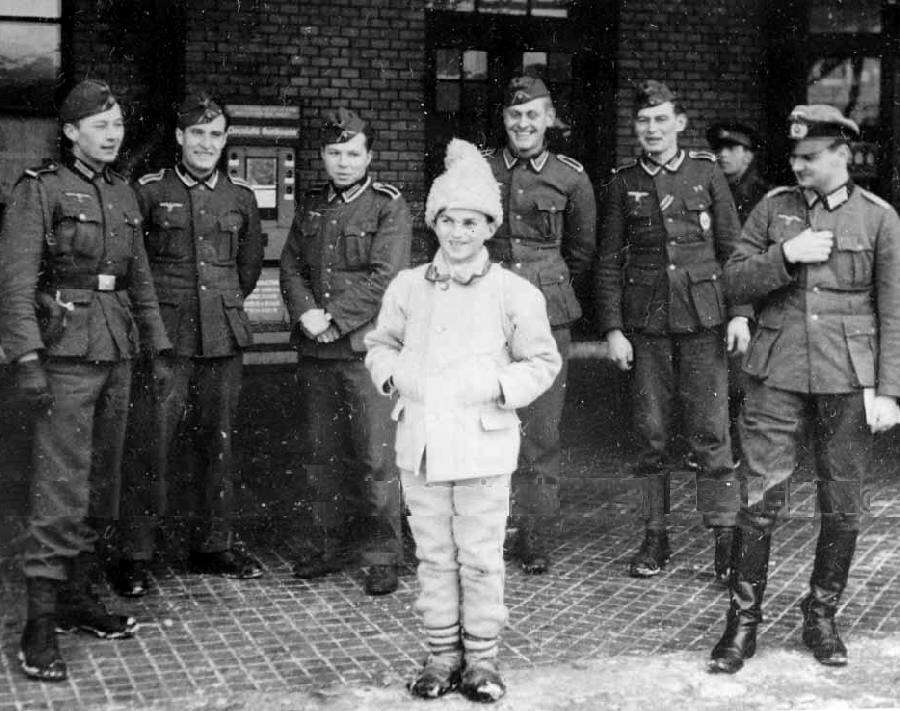
World War II German Economic Exploitation of Romania (1940-44)

Figure 1.--This German photograph is unidentified, but was clearly taken in Romania. The boy is wearing traditional folk clothing, this was still common in rural areas. We believe the photograph was probably taken in October 1940. It appears to be at a railroad station. The Wehrmact took control of the Romanian rail system which essentially gave them control of the economy.
|
|
Romania requested a German military missiin (October 1940) and then joined the Axis (November 1940). One might think that there would have been economic benefits acruing to Romania. Actually just the opposite was true. Countries which did not join the Axis (Portugal, Spain, Sweden, Switzerland, and Turkey) benefitted from keeping the Germans at arms length. They were able to insist that the Germany pay for raw materiials and products they wanted. The country's which joined the Axis eventually turned over their economies to the Germans. Not only did the Romanians not benefit, but they suffered economically by joining the Axis. Of course the Germans may well have invaded had they not joined the Axis. But in doing so and allowing the Germans to take over the economy, the Germans were able to access oil, grain, and other raw materials without paying for them. Romania assumed the role of supplying fuel and food to the German war effort. Romanian oil was vital. Germany began the war with a weak raw material position. And the commodity they were especially short of was oil. There were no German oil fields and only a small synthetic industry. As a result of the NAZI-Soviet Non-Agression Pact, the Soviets delivered substantial quanyities of oil, but this ended with the German invasion (June 1941). Germany could not have fought World War II without Romanian oil. As a result of the German exploitation of Romania, national economic earnings dropped significantly. Oil was by far the most important commodity. The Romanians also supplied the Germans with grain, and industrial products. The Germans provided very little in payment. We are not sure if there was any formal economic aggreement signed between the two countries. I believe the Germans were able to take what they wanted by the simple expedient of taking over the Romanian railways, but we vdo not yet have details on this. The Germans essentially seized the oil and other goods. The export of a major part of Romania's production without receiving much of anything in return resulted in an increasingly serious inflation problem. Government officials who were aware of what was happening began compaining about exploitive NAZI policies. Criticizing the Germans was, however, something which was dangerous to do.
Sources
Mazower, Mark. Hitler's Empire: How the Nazis Ruled Europe (Penguin Press: New York, 2008), 726p
CIH -- WW II

Navigate the CIH World War II Section:
[Return to Main German intervention in Romania page]
[Return to Main German Balkan policy page]
[Return to Main World War II Romanian page]
[About Us]
[Aftermath]
[Biographies]
[Campaigns]
[Children]
[Countries]
[Deciding factors]
[Diplomacy]
[Geo-political crisis]
[Economics]
[Home front]
[Intelligence]
[Military forces]
[POWs]
[Resistance]
[Race]
[Refugees]
[Technology]
[Totalitarian powers]
[Bibliographies]
[Contributions]
[FAQs]
[Images]
[Links]
[Registration]
[Tools]
[Return to Main World War II page]
[Return to Main war essay page]
[Return to CIH Home page]
Created: 9:17 AM 6/10/2011
Last updated: 9:17 AM 6/10/2011



